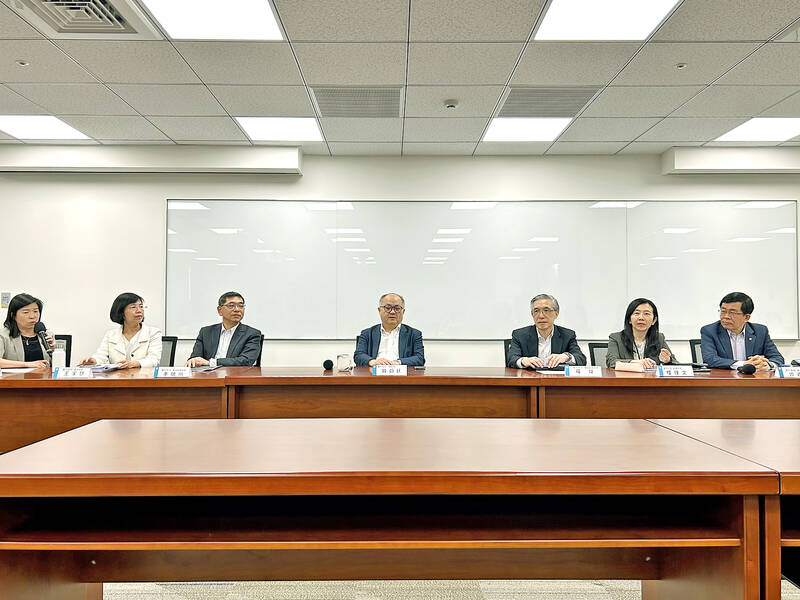Fubon Financial Holding Co (富邦金控) yesterday said it retained the most profitable status among peers after posting a net income of NT$13.98 billion (US$454.4 million) for last quarter when financial markets at home and abroad showed relative stability.
The financial results translated into earnings per share of NT$1.13, as all subsidiaries made contributions except its non-life insurance arm, Fubon Insurance Co (富邦產險), which remained unprofitable due to COVID-19 claims, the Taipei-based conglomerate said.
“The group managed to post stable earnings with help from subsidiaries,” Fubon Financial chairman Richard Tsai (蔡明興) said in a statement after an investors’ conference.

Photo: Wu Hsin-tien, Taipei Times
The banking arm, Taipei Fubon Commercial Bank (台北富邦銀行), has grown to be Taiwan’s largest private lender by number of branches after its merger with Jih Sun International Bank (日盛銀行) on April 1, Tsai said.
The lender last quarter saw its number of credit cards soar 3.8-fold to more than 800,000, due to a credit card partnership with Costco Wholesale Taiwan Ltd (台灣好市多) that contributed to 80 percent of the increase, it said, adding that credit card spending spiked 19.9 percent year-on-year.
Fubon Securities Co (富邦證券) gained noticeable market share and customers after integration with Jih Sun Securities Co (日盛證券) on April 9, Tsai said.
“Synergy benefits would become more evident in the future,” he added.
Fubon Life Insurance Co (富邦人壽) generated NT$7.25 billion in net income, making it the best performer among local peers, but it ranked second in terms of first-year premiums and total premiums, it said.
The life insurance arm made progress in boosting sales of policies paid in installments, lifting their share to 39.2 percent from 18.2 percent, the conglomerate said.
The group’s sales channels accounted for 70 percent of first-year premiums, it said.
Fubon Life Insurance yesterday updated its embedded value, which tumbled 18.2 percent from 2021 to NT$798.6 billion, or NT$64.4 per share, at the end of last year.
The company said the decline was due to capital market volatility weighing on insurance policy sales.
Against that backdrop, the value of new business fell 6.8 percent to NT$16.6 billion, it said.
The conglomerate said it has a neutral view about the local bourse, and it posted NT$16.3 billion in profit last quarter.
It prefers range trading in times of economic uncertainty, it said.

With an approval rating of just two percent, Peruvian President Dina Boluarte might be the world’s most unpopular leader, according to pollsters. Protests greeted her rise to power 29 months ago, and have marked her entire term — joined by assorted scandals, investigations, controversies and a surge in gang violence. The 63-year-old is the target of a dozen probes, including for her alleged failure to declare gifts of luxury jewels and watches, a scandal inevitably dubbed “Rolexgate.” She is also under the microscope for a two-week undeclared absence for nose surgery — which she insists was medical, not cosmetic — and is

CAUTIOUS RECOVERY: While the manufacturing sector returned to growth amid the US-China trade truce, firms remain wary as uncertainty clouds the outlook, the CIER said The local manufacturing sector returned to expansion last month, as the official purchasing managers’ index (PMI) rose 2.1 points to 51.0, driven by a temporary easing in US-China trade tensions, the Chung-Hua Institution for Economic Research (CIER, 中華經濟研究院) said yesterday. The PMI gauges the health of the manufacturing industry, with readings above 50 indicating expansion and those below 50 signaling contraction. “Firms are not as pessimistic as they were in April, but they remain far from optimistic,” CIER president Lien Hsien-ming (連賢明) said at a news conference. The full impact of US tariff decisions is unlikely to become clear until later this month

GROWING CONCERN: Some senior Trump administration officials opposed the UAE expansion over fears that another TSMC project could jeopardize its US investment Taiwan Semiconductor Manufacturing Co (TSMC, 台積電) is evaluating building an advanced production facility in the United Arab Emirates (UAE) and has discussed the possibility with officials in US President Donald Trump’s administration, people familiar with the matter said, in a potentially major bet on the Middle East that would only come to fruition with Washington’s approval. The company has had multiple meetings in the past few months with US Special Envoy to the Middle East Steve Witkoff and officials from MGX, an influential investment vehicle overseen by the UAE president’s brother, the people said. The conversations are a continuation of talks that

CHIP DUTIES: TSMC said it voiced its concerns to Washington about tariffs, telling the US commerce department that it wants ‘fair treatment’ to protect its competitiveness Taiwan Semiconductor Manufacturing Co (TSMC, 台積電) yesterday reiterated robust business prospects for this year as strong artificial intelligence (AI) chip demand from Nvidia Corp and other customers would absorb the impacts of US tariffs. “The impact of tariffs would be indirect, as the custom tax is the importers’ responsibility, not the exporters,” TSMC chairman and chief executive officer C.C. Wei (魏哲家) said at the chipmaker’s annual shareholders’ meeting in Hsinchu City. TSMC’s business could be affected if people become reluctant to buy electronics due to inflated prices, Wei said. In addition, the chipmaker has voiced its concern to the US Department of Commerce